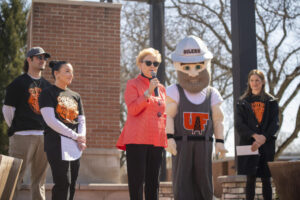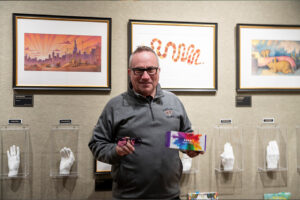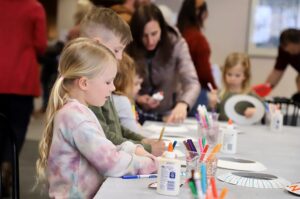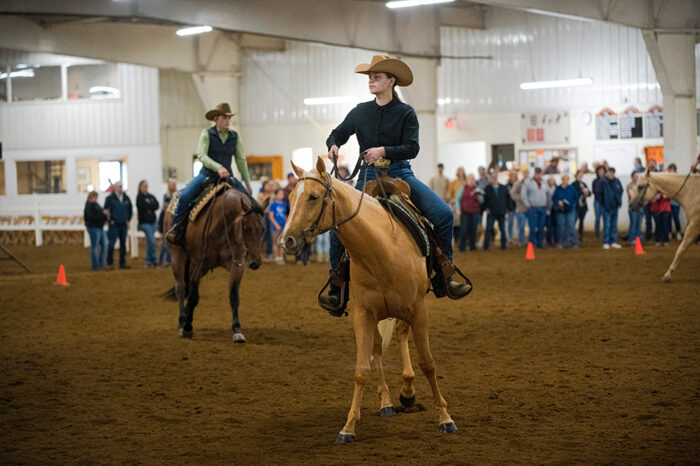Curiosity Creates a Career
Summer internships are a time for growth and education for Findlay students ending in a rewarding professional experience. For Laura Inbody, a year-four transfer student in the College of Pharmacy, it ended with an awards ceremony as well. During a summer internship with the National Institute of Neurological Disorders and Strokes (NINDS), a division within the National Institute of Health (NIH), her pharmaceutical research was awarded the Exceptional Summer Student Award and she was asked to deliver a podium presentation during the NINDS awards ceremony.
 NINDS is known for conducting and funding research on brain and nervous disorders. During her summer internship, Inbody researched the role of the G protein-coupled receptor kinase 2, GRK2, and its involvement in the D2 receptor signaling pathways. The D2 receptor plays an important role in the pathophysiology of many diseases, such as Schizophrenia and Parkinson’s disease. The receptor class, the G protein-coupler receptors, are one of the most common receptor types for drugs. Her research involved utilizing GRK2 inhibitors to try and prevent D2 receptor internalization, leading to the prolonged presence of the receptor at the cell surface and increase the ability of the receptor to participate in signaling events. By increasing the presence of receptor at the cell surface, smaller amounts of drugs can be administered to elicit the desired effects and decrease side effects. Inbody presented her research process and results during the end of summer intern symposium. There, she was reviewed by a panel of judges and presented the entirety of her research the following day as the winner of the competition.
NINDS is known for conducting and funding research on brain and nervous disorders. During her summer internship, Inbody researched the role of the G protein-coupled receptor kinase 2, GRK2, and its involvement in the D2 receptor signaling pathways. The D2 receptor plays an important role in the pathophysiology of many diseases, such as Schizophrenia and Parkinson’s disease. The receptor class, the G protein-coupler receptors, are one of the most common receptor types for drugs. Her research involved utilizing GRK2 inhibitors to try and prevent D2 receptor internalization, leading to the prolonged presence of the receptor at the cell surface and increase the ability of the receptor to participate in signaling events. By increasing the presence of receptor at the cell surface, smaller amounts of drugs can be administered to elicit the desired effects and decrease side effects. Inbody presented her research process and results during the end of summer intern symposium. There, she was reviewed by a panel of judges and presented the entirety of her research the following day as the winner of the competition.
A research enthusiast, Inbody was led to this internship by her professor, Dr. Ryan Schneider, Pharm. D., Ph.D., who had previously studied with a researcher at NIH. “I really found my niche while doing research with Dr. Schneider,” she said. “I was always asking questions and wondering why things worked the way they did and he was great about fostering that curiosity.” In the lab under the supervision of Findlay faculty was where Inbody was able to hone her lab techniques and research skills which prepared her for the internship at NIH.
 The mentors at NINDS also helped to develop her research skills to reach a professional level. Working at one of the largest nationally funded research centers allowed Inbody to experience how research worked on a large scale and across multiple departments. “They taught me how to look at my data and figure out what path I should take next. This summer was a lesson in self-guidance in research, but also when I should seek help for something I don’t quite understand,” she said. She credits her project mentors, Dr. Marta Sanchez-Soto and Dr. Benjamin Free, and the head of the lab, Dr. David Sibley, with guiding her during her project and teaching her additional research techniques for more obscure topics. “It’s crazy how much we don’t know,” said Inbody about a particular topic she was asked to research. “I looked for hours and there is still so much information out there that we haven’t looked into. Even the things we do know, not everything is clear and concise. It’s part of the reason why I love the field, it’s always growing and adapting with new research.”
The mentors at NINDS also helped to develop her research skills to reach a professional level. Working at one of the largest nationally funded research centers allowed Inbody to experience how research worked on a large scale and across multiple departments. “They taught me how to look at my data and figure out what path I should take next. This summer was a lesson in self-guidance in research, but also when I should seek help for something I don’t quite understand,” she said. She credits her project mentors, Dr. Marta Sanchez-Soto and Dr. Benjamin Free, and the head of the lab, Dr. David Sibley, with guiding her during her project and teaching her additional research techniques for more obscure topics. “It’s crazy how much we don’t know,” said Inbody about a particular topic she was asked to research. “I looked for hours and there is still so much information out there that we haven’t looked into. Even the things we do know, not everything is clear and concise. It’s part of the reason why I love the field, it’s always growing and adapting with new research.”
Inbody did not always have such confidence in her path, in fact, her college career started out in a different program at a different school. Formerly an engineering student at The Ohio State University, she stated that the further she got into to the coursework, the more that engineering just didn’t feel like the right fit. After receiving exposure to pharmacology and toxicology through a part time job, something stirred within her and she discovered that she was excited to learn about the medicinal properties of certain chemicals. “I wanted to know about how everything worked,” she explained. “I wanted to know about how the chemistry of the molecule was creating the desired effect and why they did research the way they did. It was the point at which I decided to pursue pharmacy as a career.” She still credits her time in engineering as part of her success in her pharmacy courses. “I learned the right strategies for how to attack a problem and start gathering information. I was able to transfer that engineering knowledge into pharmacy and was really happy to be able to do that.”
Inbody is planning on continuing towards a career in the pharmaceutical research field, which she has found a passion and curiosity for research. “This summer, I really figured out that research was for me. My internship didn’t feel like a job. I was excited to go to work and had fun while working in the lab,” she said. She is looking forward to the rest of the school year where she will be guiding underclassmen in their research experience and presenting her own research with her research lab group at upcoming conferences. “It’s a very rewarding experience to present at national conferences with people I’m close with and be able to share our hard work with others,” she explained. “Sometimes in class you lose sight of the pharmacology; but with this experience, you get to see the community around it and people who are interested in your work and want to help you grow in the research field.”
To learn more about the University of Findlay College of Pharmacy, please visit www.findlay.edu/pharmacy.














